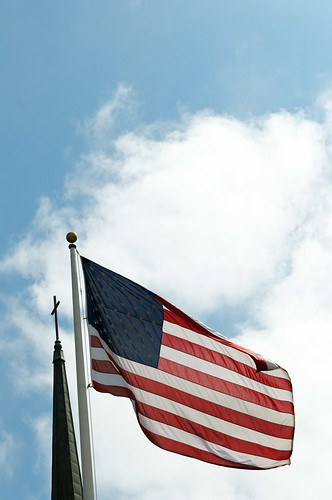 |
| Photo Credit: Hitchster |
In light of the current contentious political season in which we find ourselves, the following words from Os Guinness, published in 2003, are particularly appropriate for all those who consider ourselves followers of Jesus:
"If it is wrong to make faith privately engaging but socially irrelevant, then surely politics is the lever to bring faith back into all of life. Or so many Christians have thought in recent decades. But if privatization lacks the "totality" of faith, the problem of politicization is the lack of "tension." Called to be "in" the world but "not of it," Christian engagement in politics should always be marked by tension between allegiance to Christ and identification with any party, movement, platform, or agenda. If that tension is ever lacking, if Christian identification with a political movement is so close that there is not any clear remainder, then the church has fallen for a particularly deadly captivity.
Political forms of this "Babylonian captivity" are a problem already writ large over European history and a central reason for modern Europe's rejection of the Christian church. Indeed, there is a direct and unarguable relationship between the degree of the church's politicization in a culture and the degree of the church's rejection by that culture -- the French and Russian revolutions being the extreme examples of a volcanic reaction to corrupt state churches that were monopolistic and allowed no dissent. The revolutionary slogan of 1789 was typical of this backlash: "Strangle the last king with the guts of the last priest!"
For two hundred years the churches in the United States have avoided this pitfall - thanks largely to the genius of the First Amendment, the constructive separation of church and state, and the creation of the voluntary associations that shifted the moral agency from the local church as a corporate body to individual Christians acting in concert with others. But the last quarter of a century indicates a different story. Christians have every right to be in the public square and every right to the positions they have. That is not the problem. But to the degree that Christian activism in public life become a politicization of the church -- an identification with political movements on either right or left without critical tension -- to that degree Christian activism will betray Christ and stoke the fires of its own and the church's rejection.
There are signs that an American equivalent of Europe's antipathy to politicized faith is already beginning to build. Few things are more fateful for the future of faith in the modern world than to see that this development stops."
Os Guinness,
The Call: Finding and Fulfilling the Central Purpose of Your Life

No comments:
Post a Comment